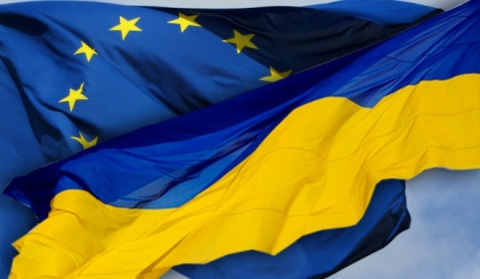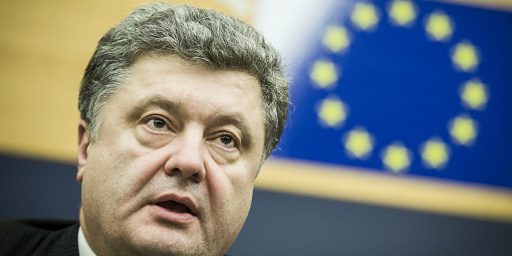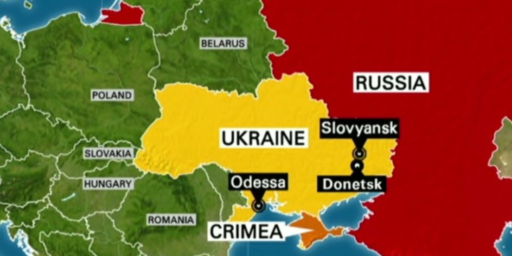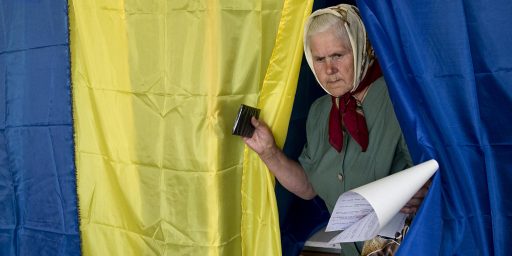Ukraine Signs Trade Deal With Europe
Ukrainian President Petro Poroshenko has signed the trade deal with Europe that his predecessor rejected, setting off a series of protests that led to him being deposed as well as a crisis in eastern Ukraine that continues to unfold:
BRUSSELS — Seven months after Ukraine’s former president Viktor F. Yanukovych rejected a sweeping trade deal with the European Union and set off protests that drove him from power, Ukraine’s new leader on Friday concluded the pact, which Russia has bitterly opposed as a threat to its own economic and strategic interests in the former Soviet Union.
The news agency Interfax in Moscow quoted Russia’s deputy foreign minister as warning that “serious consequences” would follow the signing of a deal that Moscow has long worked to derail.
Petro O. Poroshenko, a confectionary mogul who won Ukraine’s presidential elections in May to fill a post left vacant by Mr. Yanukovych’s flight from the country in February, signed the so-called Association Agreement at the Brussels headquarters of the European Union shortly before a summit meeting of leaders of the bloc’s 28 countries.
In a statement issued by his office, Mr. Poroshenko said: “This is one of the most important days in the time since Ukraine won independence. We use this possibility to modernize the country. But we need only one thing — peace and security.”
The accord with the European Union fulfills an election promise by Mr. Poroshenko to move Ukraine closer to Europe, reversing a course set by Mr. Yanukovych before his ouster. But it could complicate another pledge he made to curb violence by separatists who have seized government buildings in a number of cities in eastern Ukraine where residents feel a close affinity to neighboring Russia.
Russia has denied any hand in the violence, but armed fighters spearheading the separatist rebellion depend on arms, funding and manpower from across the border. The United States and Europe have repeatedly called on President Vladimir V. Putin to halt this traffic, something he is unlikely to do if Russia wants to display its displeasure over the trade pact with Brussels. The Kremlin warned earlier this week that a trade deal between Kiev and Brussels would force Moscow to suspend preferential tariff rates to Ukrainian goods, and there is concern that Russia might go further by stoking additional violence in eastern Ukraine.
The signing of the accord by Mr. Poroshenko represented a hugely symbolic political victory, and was greeted in Kiev as a triumph for the thousands of demonstrators who camped out for months in Independence Square, ultimately driving Mr. Yanukovych to flee to Russia. Europe’s call, however, for integrating Ukraine politically and economically into the West seems as distant as ever given the violence still plaguing the east of the country.
In a statement issued by his office, Mr. Poroshenko said: “This is one of the most important days in the time since Ukraine won independence. We use this possibility to modernize the country. But we need only one thing — peace and security.”
The accord with the European Union fulfills an election promise by Mr. Poroshenko to move Ukraine closer to Europe, reversing a course set by Mr. Yanukovych before his ouster. But it could complicate another pledge he made to curb violence by separatists who have seized government buildings in a number of cities in eastern Ukraine where residents feel a close affinity to neighboring Russia.
Russia has denied any hand in the violence, but armed fighters spearheading the separatist rebellion depend on arms, funding and manpower from across the border. The United States and Europe have repeatedly called on President Vladimir V. Putin to halt this traffic, something he is unlikely to do if Russia wants to display its displeasure over the trade pact with Brussels. The Kremlin warned earlier this week that a trade deal between Kiev and Brussels would force Moscow to suspend preferential tariff rates to Ukrainian goods, and there is concern that Russia might go further by stoking additional violence in eastern Ukraine.
The signing of the accord by Mr. Poroshenko represented a hugely symbolic political victory, and was greeted in Kiev as a triumph for the thousands of demonstrators who camped out for months in Independence Square, ultimately driving Mr. Yanukovych to flee to Russia. Europe’s call, however, for integrating Ukraine politically and economically into the West seems as distant as ever given the violence still plaguing the east of the country.
Economically, this deal has always made more sense for Ukraine than the pact with Russia that Yanukovych favored, and it’s no surprise that Poroshenko moved to finalize it so quickly after winning election just a month ago. At the same time, though, one has to wonder what impact this will have in Moscow and on the ongoing effort to resolve the situation in the east.






You misspelled “future”.